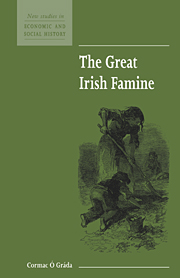Book contents
- Frontmatter
- Contents
- Preface
- Introduction
- 1 Population and potatoes: the pre-Famine context
- 2 The Great Hunger 1845–1850
- 3 Aftermath: Ireland after 1850
- 4 Conclusion
- Select bibliography
- Bibliographical update and commentary
- Glossary
- Index
- Titles available in the New Studies in Economic and Social History series
- Titles available in the Studies in Economic History series
- Economic History Society
Introduction
Published online by Cambridge University Press: 05 June 2012
- Frontmatter
- Contents
- Preface
- Introduction
- 1 Population and potatoes: the pre-Famine context
- 2 The Great Hunger 1845–1850
- 3 Aftermath: Ireland after 1850
- 4 Conclusion
- Select bibliography
- Bibliographical update and commentary
- Glossary
- Index
- Titles available in the New Studies in Economic and Social History series
- Titles available in the Studies in Economic History series
- Economic History Society
Summary
History provides many examples of famines that cost more human lives than the Great Irish Famine. Reliable evidence on famine casualties tends to be skimpy, but fine comparisons are not called for: enough to note that in northern China in 1877–8 a famine accounted for 9 to 13 million deaths, and in 1932–3 in the Ukraine another for probably at least 3 million; or that, by a recent reckoning, the dreadful Bengali famine of 1940–3 carried off 10 millions. In this league of doom the cost of Ireland's misfortune – about one million lives – may seem small. Measured in proportionate terms, however, the Irish famine's toll exceeded these others, though even in Ireland itself, a lesser-known famine in 1740–1 may have killed a higher share of the people. Still, the ‘Great Hunger’ has gained wider and more lasting notoriety than most famines. There are several reasons for this. The first is its popularity as a case study in Malthusian exegesis. The price paid by the reckless Irish for their high nuptiality and their large families – both widely noted at the time – is often singled out as a particularly stark instance of the ‘principle of population’ in action. Second, to students of economics everywhere the Famine recalls an example, however dubious, of that elusive phenomenon, the ‘Giffen’ good (*). The Irish poor, so it was claimed, in desperation flouted the law of demand by demanding more potatoes as their price rose.
- Type
- Chapter
- Information
- The Great Irish Famine , pp. 1 - 4Publisher: Cambridge University PressPrint publication year: 1995



